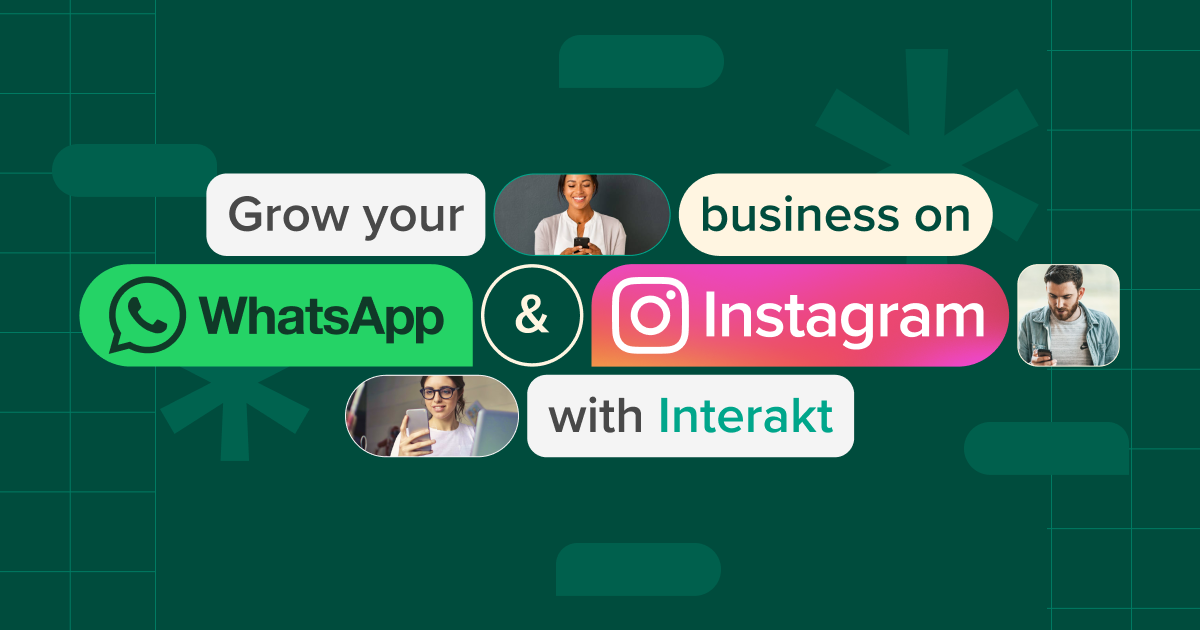WhatsApp has become a go-to communication channel for businesses across industries, helping with customer support, marketing, and sales.
However, like emails, calls, and social media, it works best when integrated with other channels for a connected customer experience.
In this post, we look at how you can use the WhatsApp Business API for better omnichannel communication.
What is WhatsApp API?
The WhatsApp Business API is a communication interface designed for medium and large businesses, helping them integrate WhatsApp with their existing systems. It supports automated messaging, real-time customer interactions, and secure two-way communication at scale.
Why Choose WhatsApp API for Omnichannel Communication
Here’s why you should choose WhatsApp API for omnichannel communication:
1. Seamless customer engagement across channels
With roughly 3 billion active users, WhatsApp is where your customers spend their time. Using the API, you can make communication effortless, instant, and more personal across multiple channels without forcing customers to switch platforms.
2. High open and response rates
Emails often go unread, but 99% of WhatsApp messages are opened, and 80% are read within 5 minutes. If your goal is faster responses and higher engagement, the WhatsApp API gives you that edge.
3. Automated and scalable messaging
WhatsApp Business API helps businesses to automate routine communications, such as order confirmations and appointment reminders, allowing for scalable customer engagement without additional manual effort.
4. Rich media support for interactive conversations
WhatsApp supports various media formats like images, videos, documents, and interactive buttons, making conversations more engaging and easier to navigate for customers. Also, 90% of rich media messages are opened within 15 minutes, and customers engage with them for about 45 seconds, far longer than plain text messages.
5. End-to-end encryption for secure communication
Data privacy is non-negotiable, and WhatsApp API ensures every message stays private and protected with end-to-end encryption. In a time when 87% of businesses prioritise security, using a fully encrypted platform helps you safeguard customer information, build trust, and stay compliant with regulations like GDPR.
6. Integration with CRM and business tools
A disorganised system slows you down. WhatsApp API integrates with your CRM, chatbots, and automation tools to track conversations, personalise interactions, and manage data all in one place, with no more switching between platforms.
7. 24/7 customer support with chatbots
Customers expect quick answers at any time of day. Businesses using AI chatbots can reduce customer service staffing needs by 68% during peak seasons and 51% throughout the year.
8. Global Reach with localised messaging
WhatsApp is available in over 180 countries. With WhatsApp API, you can send localised messages in multiple languages, ensuring customers feel valued and understood, no matter where they are.
9. Cost-effective compared to traditional channels
WhatsApp API helps businesses cut costs by automating responses and facilitating communication. Enterprises using WhatsApp integration have seen a 30% reduction in support costs, making it a more efficient and budget-friendly alternative to traditional channels.
Key benefits of using WhatsApp API in omnichannel strategies
Here are some benefits of using WhatsApp API in an omnichannel strategy:
1. Unified customer experience across platforms – WhatsApp API integrates with other communication channels like email, SMS, and CRM, helping businesses maintain a consistent and connected customer journey.
2. Seamless handoff between chatbots and live agents – Automated chatbots handle routine queries, while complex issues are transferred to human agents instantly, ensuring efficient and uninterrupted communication.
3. Real-time notifications and updates – Businesses can send instant alerts for orders, payments, bookings, and customer support updates, ensuring customers stay informed at all times.
4. Frictionless two-way communication – Customers can reply, ask questions, and receive quick resolutions within WhatsApp, eliminating the need to switch between platforms for support.
5. Enhanced customer retention and loyalty – Personalised messaging, timely follow-ups, and proactive support help businesses increase engagement and build long-term customer relationships.
6. Efficient order tracking and customer support – Customers can track orders, request returns, and receive assistance directly on WhatsApp, reducing delays and improving overall satisfaction.
7. Data-driven insights for better engagement – Businesses can track message performance, customer response rates, and behavioural patterns to improve their messaging strategies and engagement.
8. Easy payment integration for faster conversions – WhatsApp API supports secure, in-app payments, reducing drop-offs and making purchasing more convenient for customers.
9. Reduced cart abandonment with timely follow-ups – WhatsApp automated reminders and promotional messages help recover abandoned carts and encourage customers to complete their purchases.
10. Customisable workflows for different use cases – Businesses can automate interactions, create personalised customer journeys, and optimise workflows based on specific industry needs and customer preferences.
How to Integrate WhatsApp API with CRM for Communication
Here’s how you can integrate WhatsApp API with CRM for communication:
1. Choose the right WhatsApp Business API provider
Start by selecting a reliable WhatsApp Business API provider like Interakt, which offers end-to-end solutions for integrating WhatsApp with various CRM systems.
2. Ensure your CRM supports WhatsApp API integration
Once you have a provider, check if your CRM system is compatible with WhatsApp API. Popular platforms like Zoho, HubSpot, and Salesforce integrate easily with Interakt, enabling businesses to manage conversations, automate workflows, and track interactions effortlessly.
3. Set up API credentials and authentication
After confirming compatibility, the next step is to obtain API credentials from your provider and complete authentication. This is essential to securely connect WhatsApp API with your CRM, ensuring authorised access and compliance with WhatsApp policies.
4. Configure webhooks for real-time messaging
With authentication, you must set up webhooks to receive instant alerts for incoming messages, automate responses, and track conversations, ensuring no customer query goes unnoticed.
5. Sync customer data for personalised interactions
Once webhooks are configured, the next step is syncing customer data between WhatsApp API and your CRM. This helps you store chat history, preferences, and past interactions, providing highly personalised responses and maintaining conversation context.
6. Automate conversations with chatbots and templates
Use AI chatbots and pre-approved WhatsApp templates to automate routine queries like order updates, FAQs, and appointment confirmations. Interakt provides built-in chatbot functionality, helping businesses scale communication while improving response time.
7. Enable multi-agent support for seamless handling
As customer interactions increase, enabling multi-agent support helps teams to manage conversations more efficiently. Interakt’s shared inbox allows multiple agents to collaborate on a single WhatsApp number, ensuring faster resolutions and smoother interactions.
8. Monitor and analyse conversations with reporting tools
With automation in place, tracking performance using analytics tools is crucial. Monitor customer engagement, response times, and conversation history to get insights for improving communication strategies and efficiency.
9. Ensure compliance with WhatsApp Business policies
Before sending messages, businesses must follow WhatsApp’s messaging policies. A reliable API provider like Interakt helps businesses meet these requirements by guiding them through template approvals and opt-in management, reducing the risk of policy violations.
10. Optimize workflows for sales, support, and marketing
Finally, businesses should optimize their sales, support, and marketing workflows using WhatsApp automation for lead nurturing, customer follow-ups, and personalised engagement.
Best Practices for Omnichannel Communication Using WhatsApp API
Here are some best practices you can follow for omnichannel communication using WhatsApp API:
1. Maintain a unified brand voice across channels
Keep your WhatsApp messaging aligned with email, SMS, and social media to ensure consistency, professionalism, and brand recognition.
2. Leverage automation while keeping a human touch
Use chatbots for FAQs and routine queries, but allow live agents to handle complex issues for a more personalised experience.
3. Segment customers for personalised messaging
Group customers by purchase behaviour, interests, or engagement and personalise WhatsApp campaigns using CRM tags and labels.
4. Use rich media to enhance engagement
Send images, videos, and interactive buttons to make messages more engaging. Use product images for promotions and videos for customer support.
5. Optimize response times with AI-powered chatbots
Use AI-powered chatbots to automate order tracking, FAQs, and scheduling, reducing wait times.
6. Ensure two-way communication for better customer experience
Encourage customers to ask questions, share feedback, and interact using quick reply buttons and response prompts.
7. Sync data across CRM and other business tools
Connect WhatsApp API with your CRM, helpdesk, or e-commerce platform to provide agents with entire customer history for accurate responses.
8. Monitor performance and improve workflows
Track response times, open rates, and customer satisfaction to refine chatbot automation and agent training for better efficiency.
9. Follow WhatsApp’s messaging guidelines
Ensure all messages comply with WhatsApp’s policies, including using pre-approved templates for outbound messages and securing customer opt-ins.
10. Use proactive messaging for customer retention
Send order updates, personalised offers, and follow-ups on abandoned carts and loyalty programs to bring repeat business.
Common Challenges and How to Overcome Them
While WhatsApp API improves communication, businesses often face challenges in implementation, compliance, and scalability. Here’s how to tackle them effectively:
1. API setup complexity
Setting up the WhatsApp API can be challenging due to technical configurations and policy compliance. Work with a trusted provider to simplify setup, manage API authentication, and comply with WhatsApp guidelines.
2. Maintaining message deliverability
High rejection rates or poor messaging strategies may prevent messages from reaching customers. To improve deliverability, use high-quality, relevant content, maintain opt-in lists, and follow WhatsApp’s messaging policies.
3. Avoiding spam flags
Unsolicited messages can flag your account as spam. Collect explicit customer opt-ins and ensure messages provide value such as updates, offers, or support, rather than just promotions.
4. Integrating with existing systems
Disjointed systems lead to inefficient workflows. Integrate WhatsApp API with your CRM to sync customer conversations, automate responses, and maintain centralised customer data.
5. Managing high-volume inquiries
Handling large volumes of messages manually can overwhelm teams. Use AI chatbots for routine queries like FAQs and order tracking, while multi-agent support ensures faster resolutions for complex inquiries.
6. Ensuring data privacy & security
Data security is a priority, and any breach can break trust. Use WhatsApp’s end-to-end encryption to keep messages private and follow GDPR and compliance standards to protect sensitive information.
7. Balancing automation with human support
Automation improves efficiency, but customers still expect human support when needed. Use chatbots for common queries and escalate complex issues to live agents.
8. Handling multiple customer journeys
Different customer needs require different communication approaches. Segment audiences based on behaviour, engagement, or purchase history and automate workflows to deliver relevant communication at the right time.
9. Tracking & measuring success
Improving communication becomes difficult without tracking performance. Monitor response times, engagement rates, and message performance to refine strategies and improve results.
10. Keeping up with WhatsApp policy changes
WhatsApp regularly updates its policies, and non-compliance can lead to restrictions. Monitor WhatsApp’s official updates and adjust messaging strategies to stay compliant.
Conclusion
WhatsApp is essential for fast, personalised, and efficient customer communication. Integrate it into your omnichannel strategy to improve engagement and interactions.
Get started with Interakt to simplify your WhatsApp API integration today!






